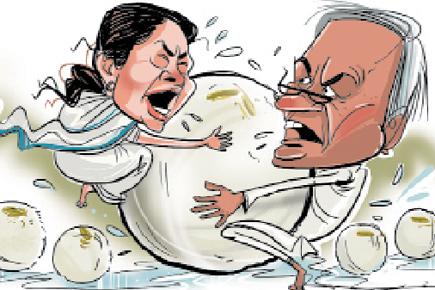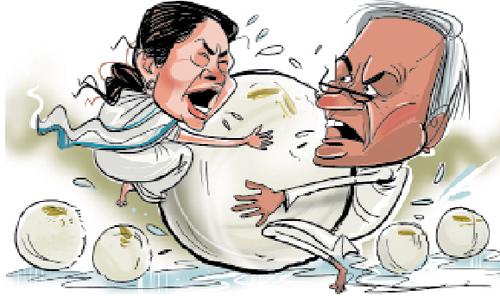Panic in Writers Building as Naveen Patnaik contemplates GI tag for the rosogolla. Will there be bloodshed?

Naveen Patnaik
Kolkata resident Subodh Chandra Nag, whose grandfather was behind the city’s 250 year-old Bhim Nag sweetmeat chain, calls it “the century’s biggest joke”. Ad professional and guru to late filmmaker, Rituparna Ghosh, Ram Ray terms it “utter rubbish”. The gentlemen are discussing the claim that rosogollas — cottage cheese balls soaked in sugar syrup, considered Bengal’s most prominent mishti — originated in what is present day Orissa.
ADVERTISEMENT

Illustration / Uday Mohite
Their next-door neighbours are serious. There is news that the Orissa government is considering applying for a Geographical Indication (GI) tag for the sweet, sought for foods that have acquired distinctiveness due to climate, soil or human factors that could include manufacturing tradition and skills. Once granted, those selling the food without the consent of the government body that owns the registration could face legal action. Passed by Parliament in 1999, the GI of Goods (Registration and Protection Act) is administered by Controller General of Patents, Designs and Trade Marks.
It’s just a sweet, you say? But the Bengalis claim the rosogulla is integral to their life-long craving for 3 Rs (the other two being Ray and Rabindra Sangeet).
Well, on paper, there is little that should get their goat, or disturb the West Bengal government, whose chief minister Mamata Banerjee heard the provocative news on her recent tour of London.
Her rivals in the Orissa state secretariat, egged on by CM Naveen Patnaik, wish to push the argument that the sweet was invented in Pahala, a hamlet close to Bhubaneswar, many moons ago, when Lord Jagannath (reincarnation of Lord Vishnu) offered rosogollas to his wife, Goddess Lakshmi, for leaving her behind while holidaying.
Expectedly, residents of Puri and Bhubaneswar, who consider the Bengali version a counterfeit, are backing Patnaik’s claim. There are indications that he could move the GI application post Independence Day. Securing the status involves publicizing it in public, so that objections can be raised if necessary. But sweetmeat sellers in Bengal are not ready to throw in the towel yet. They say, what Oriyas are claiming is rosogolla is in fact, khir mohana, a greyish-coloured sweet ball offered to Goddess Lakshmi a day after the famous Puri Ratha Yatra in a tradition that's 700 years old. The kheer mohan then could be the rosogolla’s ancestor.
“It’s a ridiculous demand because the Puri sweetmeat was never rosogolla. The white, spongy variety originated in 1868 in Bengal. We will contest Orissa’s move,” says Swapan Debnath, minister of state for micro and small scale enterprises and textiles. The CM, he admits, has asked him to seek legal advice.
To bolster their case, the West Bengal government plans to enlist anyone and everyone who has had something to do with rosogollas. There is talk of approaching writers Jhumpa Lahiri and Amit Chaudhuri, who have discussed the unique connect Bengalis have with the rosogolla in their novels. Singer Usha Uthup could repeat a song sung by Jojo Mukherjee a few years ago, Ami Kolkatari Rosogolla (I am Kolkata’s Rosogolla).
A petition is making the rounds of Kolkata’s top sweetmeat shops and notes have been written in favour of the rosogolla by food critics Chitra Deb, Bijoya Mukhopadhyay and Nandan Bagchi. “We could even file an anticipatory petition raising our concerns in the Calcutta High Court,” says Dhiman Das, senior partner-owner of the KC Das group whose rosogollas have travelled in sealed, red-colored boxes, including to Nicaragua in the mid-80s, after Rajiv Gandhi introduced them to President Daniel Ortega. His great grandfather, Nabin Chandra Das, is believed by some to be the inventor, experimenting with boiling channa (paneer) balls in sugar syrup.
Das says when space research and development agency, ISRO wished to develop dehydrated rosogollas for Indian astronauts during a mission planned in 2016-17, their scientists consulted sweetmeat makers in Bengal, not Orissa. “And suddenly, someone — quoting the Puranas — wants to beat us in the race. No, it’s not happening.”
Chitra Deb is more than happy to help the state government retain its grip on the sweet. “It’s just pure sentiment, like that associated with Feluda, Byomkesh, the colors of East Bengal and Mohun Bagan clubs. Rosogollas are a part of Bengali life. How can they leave us?” asks Deb.
Bijoya Mukhopadhyay decides to be sanguine. There is no argument when “there are no records of what Gods ate or offered to their consorts. But the history of rosogolla with Bengal is well documented, and Orissa doesn’t feature in it.”
Kolkata filmmaker, Anjan Kanjilal, feels he — like any typical Bengali — must have the last word on the sweet. For five years, Kanjilal has distributed the mishti at the end of every performance of his much-acclaimed play, Shesh Rokkha (Saving Grace). “If Orissa takes away the rights of the rosogolla from Bengal, my theater will die. What will I distribute?"
 Subscribe today by clicking the link and stay updated with the latest news!" Click here!
Subscribe today by clicking the link and stay updated with the latest news!" Click here!






